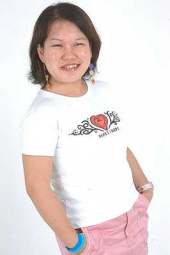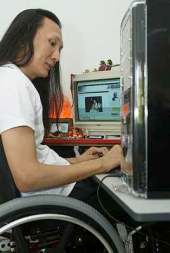Source: The Star, Fit for Life: Blogging about health, life and death
Sunday January 22, 2006
Blogging about health, life and death
If sharing is part of the healing process, then several Malaysian bloggers have found a balm for their soul. TEE SHIAO EEK looks at some health and medical blogs that share, inspire and educate.

|
|
Yvonne Foong blogs at NF Malaysia to share her opinions, encourage and help others, and spread awareness about neurofibromatosis.
|
CAN you imagine someone with cancer talking to hundreds of people every day about his battle with the disease?
One day, he describes the pain he has to endure. The next day, he bares his soul, revealing his fears and worries. Another day, he talks about facing death.
This is what Foo Hee Boon, Peter Tan and many other people living with a condition/disability are doing, via their blogs.
Their podium is the computer, and their audience is virtual. By choosing to share their experiences through a blog, they have essentially opened the doors to their lives and invited thousands of strangers in.
Take, for instance, Foo, who was diagnosed with lung cancer in 2005. His blog, Hee Boon’s Amazing New Adventures (http://fhbadventure.blogspot.com), serves to “document the exceptional experiences, special people and strange places encountered as I embark on a quest to regain my health.”
There is a sense of voyeurism in reading Foo’s blog, not unlike peeping into someone’s private journal. His emotional turmoil and physical pain are laid bare for anyone with a computer and an Internet connection to read.
Tan details similarly intimate aspects of his life on his blog called The Digital Awakening (http://www.petertan.com/blog). Tan, who is paralysed from the waist down due to a spinal cord injury and has renal failure, blogs frankly about living with a disability.
“Have you ever wondered how I do it when I have to answer the call of nature?” he writes in one of his entries.
Although there is nothing vulgar or graphic in the blog entry, one wonders: is it more awkward for him to reveal such intimate details, or for the reader to read it?
“There is no shame in being a person with physical impairment or any other impairment for that matter. It is hoped that when I reveal my life and the difficulties I have to go through, the public will be educated on my condition,” Tan shares.
My life in my blog
Although blogs (short for weblogs) started out as online journals or chatrooms of sorts, they’ve come to represent a new dimension of Internet influence.
Political blogs were among the first to start amassing power, but blogs of other topics, such as health and medicine, are no less influential, or plentiful. Blog search engine Technorati (www.technorati.com) churned out about 600 blogs on health and wellness alone.

|
|
Peter Tan … ‘It is hoped that when I reveal my life and the difficulties I have to go through, the public will be educated on my condition.’
|
General health blogs about dieting, fitness and lifestyle are a dime a dozen though. I was looking specifically for blogs by Malaysians who are living with a disease, medical condition or disability.
Besides Tan and Foo’s blogs, I also found NF Malaysia (www.nfmalaysia.org), a blog maintained by two girls with neurofibromatosis.
A regular blog-trawler knows how it works – entries are posted every hour, every day or every week, depending on how dedicated the blogger is. Visitors can post their comments to each entry, and sometimes a particularly controversial or contentious post can invite a fiery exchange of comments between the blogger and the visitor(s).
For the most part though, health blogs like Foo’s, Tan’s and NF Malaysia invite compassion and empathy for the struggle they face.
They blog about living with their condition, sometimes writing about how they are coping, what improvements they have had or what challenges they are facing.
Tan, an exceptionally articulate blogger, writes in an entry: “Not all adverse events are bad. Some are blessings in disguise. Is this how I console myself? Perhaps. My renal failure has put some perspective into my life and the things that I want to achieve. Not a day passes without me thinking about my own mortality. Not a day passes without me thinking what I can do with the limited time that I have here.”
Bloggers may describe their medical procedures and treatments, or even post pictures of themselves (for example, showing their scars, injecting insulin, hair loss after chemotherapy).
For those who use their blogs as an online diary, blogging is an opportunity to unburden their worries and fears.
However, it’s not all doom and gloom, as evinced by Foo’s blog, which is a joy to read for its positive, insightful and even humorous outlook on life and living with cancer.
Some bloggers champion causes that are related to their condition. Wheelchair-user Tan (I learnt from Tan’s blog that this phrase is more politically correct than “wheelchair-bound), highlights disability issues like independent living, disabled-friendly facilities such as accessible toilets and the rights of people with disabilities.
Some health blogs go beyond the personal and become a portal for information. Blogs like NF Malaysia and Tan’s often post bits and bobs that may be relevant to their condition, such as news articles, scientific updates, advertisements or events
Responsible bloggers and readers
Reading these blogs, particularly those by patients, you have to constantly remind yourself that they are people’s personal journals, even if they do exist on a medium that serves to remove, rather than put up, borders.
Foo gets it spot on when he describes it as “private thoughts in a public domain”.
The question is, should bloggers be held responsible for the information they provide? Is it their duty to ensure that what they blog about is accurate, especially when it comes to medical information?
“Yes, I think they should make sure the information they provide is accurate and scientifically proven,” says 19 year-old Yvonne Foong, a neurofibromatosis sufferer who is one of the co-authors of NF Malaysia. The blog is an offshoot of Foong’s personal blog (www.yvonnefoong.com).
“Some may argue that people should decide what they want to believe, but I think bloggers owe it to the society to uphold social responsibility.”
Like many bloggers, though, Foong offers a disclaimer: “Then again, if it’s stated as their own personal opinion, I don’t see anything wrong because everyone is entitled to their own opinion and the Internet is an open source for information. How else can freedom of expression be encouraged?”
What happens when “freedom of expression” enters the realm of health, where the wrong advice could cause harm? Take, for instance, blogs that recommend or discuss traditional and alternative treatments.
Tan, who has shared folk remedies on his blog, agrees that this should be handled carefully.
“Some of these remedies have been passed down from generation to generation and have not been scientifically proven. They have worked on me but I do not make it a point to recommend it to others,” he says.
“Bloggers must always practise due care and write responsibly, irrespective of what the topic is, more so when it is on subjects that may affect health and life.”
Such caution is prudent for someone like Tan, whose kidneys could be further damaged if he follows alternative remedies that have not been scientifically tested for efficacy and safety.
As a blog reader, it is your responsibility as well to exercise judgement on what you read. Being privy to a person’s trials and tribulations in battling a disease may give you a false sense of intimacy, and you could be tempted to blindly believe everything the blogger writes.
Foo reminds blog readers that a blog is based on the experience of one person, recording his/her current experience.
Therefore, do as Tan does: “I always take what I read from blogs and other Internet sources with a pinch of salt.”
If in doubt, take the information to your doctor and discuss it with him/her.
In the end, both blogger and reader should remember that a blog is highly personal. If you have made the decision to read someone’s blog, be careful about imposing your views or expectations on this person.
And be prepared to share in someone else’s pain. I’m no stranger to reading about disease and injury, but I found the experience of reading a personal blog far more discomfiting than reading the goriest, bloodiest description in a medical textbook.
Case in point: this sobering and heart-wrenching blog entry from Foo in his Amazing New Adventures:
“? it is really difficult to talk about ‘mind over matter’ when such throbbing pain assaults you. I tried, before the hospital, to use imagery to overcome the pain, I am afraid my discipline fails me. Can’t keep up the concentration with the pain banging my consciousness. Of course, I also begin to think that this is a sign that Messrs Death is beckoning and I better wrap up whatever loose ends …”
Related Stories:
A blog to bare your soul
Blogs to visit
Doc Blog

Yes I read your article in Fit For Life too. Am surprised that you found time to update your blog more frequently in Japan. You are like a bullet train now. Take Care! Keep Warm!